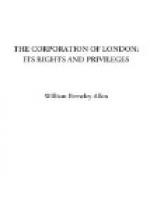But although it was not before the reign of Richard I. that the citizens of London were formed into a body corporate, they had enjoyed, as the inhabitants of a free burgh, the immunities and many essential privileges of a corporation, from the time of Edward the Confessor, if not of Alfred. Without stopping to discuss the etymology of the word “burgh,” it may suffice to observe that at the period of the Conquest by far the greater part of the cities and towns of England were the private property of the king, or of some spiritual or secular lord, on whom they had been conferred by royal grant. These burghs, as they were called, were said to be held in demesne, and paid to their superior certain tolls, duties, and customs, levied on goods exposed for sale at markets and fairs. The inhabitants were actually little better than villeins or serfs, and were entirely at the mercy of their feudal lord. Immense, therefore, were the advantages possessed by the free burghs, such as London, which governed themselves, and compounded for all dues by the payment of a fixed annual sum. These annual contributions were styled the “farm,” and, when perpetual, the burghs so compounding were said to be held at fee-farm of the king in capite, as was the case with London. One of the chief privileges implied by this tenure was that of exercising an independent jurisdiction, both civil and criminal, administered by magistrates chosen by the burgesses. It is supposed that criminal law was originally dispensed in the free gilds into which the city was divided, under the presidency of an alderman. These divisions were afterwards called wards, and were analogous to the corresponding division of the shire into hundreds. In each ward was held a court-leet, or ward-mote, dating from the time of Alfred, though the actual institution of wards by that name is no later than the reign of Edward I. Civil causes, in London at least, were tried before a peculiar tribunal, the president of which was probably the portreve, or, in minor causes, an alderman.




